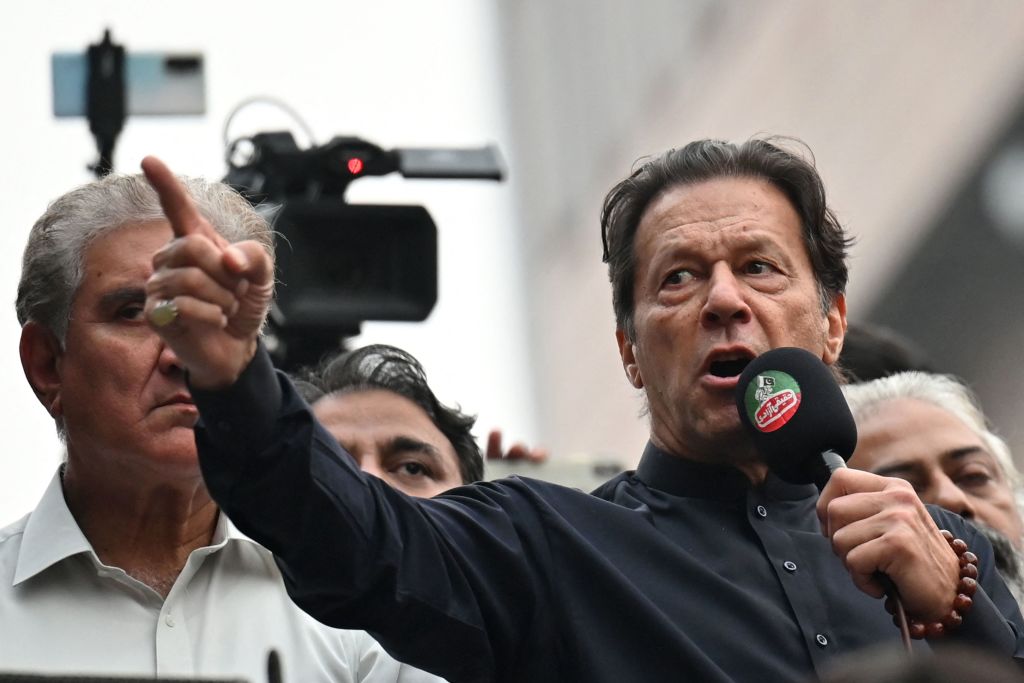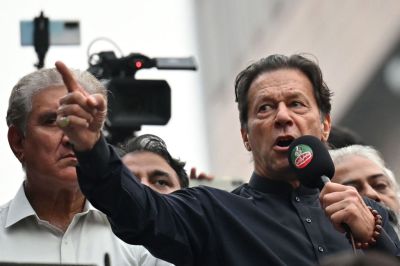Former Pakistani Prime Minister Imran Khan survived an apparent assassination attempt Thursday, deepening tensions in a country already on the edge. What does this week’s shooting mean for Khan’s political future—and the stability of his nuclear-armed nation?
Who is Imran Khan?
Khan, a 70-year-old former professional cricket player, entered politics in the 1990s by portraying himself as a reforming outsider and pious Muslim. He served as Pakistan’s prime minister from August 2018 until earlier this year.
Khan’s populism proved particularly appealing among young, middle-class, and urban voters, and he had some real accomplishments to point to.
While in power, Khan secured a bailout from the International Monetary Fund, pulling Pakistan out of a balance-of-payments crisis. His economic reforms delivered some economic growth, and he shrunk the military budget to provide relief during the COVID-19 pandemic. Yet the opposition also has accused his government of corruption and moving toward a more authoritarian system. As prime minister, he also deepened ties with American adversaries—even visiting Moscow on the day Vladimir Putin began his invasion of Ukraine.
The prime minister fell out of power earlier this year following a no-confidence vote in parliament. He insists he was overthrown by a U.S.-backed plot because he follows an independent foreign policy. While such claims are baseless, they have struck a chord in a nation frustrated with its military establishment and American involvement in the region: In June, 46 percent of Pakistanis said they believed Khan was removed due to a foreign conspiracy.
Why does Khan still matter?
Khan has spent the past few months plotting a way back to power—most notably with a march on Pakistan’s capital. Although the concept sounds dramatic, marches on Islamabad are almost routine in Pakistani politics. Political figures lead convoys of cars and minibuses, usually from nearby Lahore or Peshawa, march to the capital, and try to spook the sitting government.
Khan’s supporters were holding onto hope that marching on Islamabad to demand snap elections could eventually restore Khan to power. Although Khan has built a larger base of support, it is unlikely that this march will trigger a vote, even after the assassination attempt. Yet being shot during the march, which itself already threatened to destabilize Pakistan’s rapidly deteriorating national politics, could strengthen Khan’s political position.
Can Khan return to power?
The primary reason Khan is unlikely to get his election is that the sitting government has the sole authority to trigger a vote—and has no desire to do so: Shehbaz Sharif, the current prime minister, who Khan has dubbed the “crime minister,” would face long odds if an election were held soon.
The current government is unpopular, particularly as Pakistan’s economy remains weak.
The country faces perennial challenges such as taking on too much debt for minimally beneficial projects while the military demands large chunks of national income. Yet recent problems have compounded those structural weaknesses: Pakistan has been struggling with increasing energy prices and a strong U.S. dollar driving up the cost of imports. Summer floods caused billions of dollars worth of damage too. Now there are fears that the country will not be able to afford critical imports and could soon default on its debts.
This has increased the appeal of Khan’s political party, Pakistan Tehreek-e-Insaf. This summer Punjab, Pakistan’s largest state, gave 15 of the province’s 20 legislative seats to Khan supporters. That’s a strong sign that his current popularity could transfer into a resounding national electoral victory. The current government hopes to turn around the economy by the scheduled elections next year: Its chances could be better then, but it’s still a difficult challenge.
Another complicating factor is that the military and intelligence community appear to oppose Khan’s return. Pakistan is a flawed democracy, with its powerful military influencing politics from behind the scenes. (And sometimes its influence is more overt, with the military having overthrown the civilian government three times since 1958.)
Military officials are clear how they feel about a potential Khan return. On October 27 the director-general of Inter-Services Intelligence (ISI)—the nation’s influential national intelligence agency—made a public address to the people of Pakistan alongside a military spokesman. Both denounced Khan’s characterization of the military establishment as corrupt American puppets and called the former prime minister a liar. The ISI’s modus operandi has always been covert negotiation and compromise with public political figures; a public declaration implies that all backdoor attempts to bring Khan back in line have failed.
Although ISI manipulation played a major role in installing Khan as prime minister in 2018, the same forces helped facilitate the no-confidence vote against him in April. Khan’s resentment of the military has spread to his supporters and violent clashes could follow their arrival in the capital.
What challenges does Pakistan face now?
While the exact motives of Khan’s would-be assassin remain unknown, the timing of the shooting could not have been worse for the country’s stability.
When former prime minister Benazir Bhutto was assassinated in 2007, riots against the government engulfed the nation. And this came when economic performance was relatively strong and the country’s politics arguably less polarized. An attack on such a divisive figure as Khan in today’s environment—where conspiratorial thinking mixes with violent rhetoric—can only trigger further discord.
While campaigning for his march, Khan posed the question of whether his movement's revolution would be a “soft one through the ballot box or a destructive one through bloodshed?” On Thursday Fawad Chaudhry, a senior member of Khan’s party, called on supporters to “avenge the attack on Imran Khan.”
The march itself—and subsequent disruptions around the capital—could also worsen the country’s already precarious economic situation. Sharif’s government has been working with the IMF to avert a default, but the organization may hesitate to work with a government that could be gone in a year. If Khan supporters unleash chaos, the IMF could also question supporting a state unable to maintain order.
Even if Sharif’s government maintains its working relationship with the IMF, it will be on the condition of implementing unpopular measures, such as raising taxes. Khan could spin these measures as another example of the government being puppets of foreign interests. Unless Sharif’s government can produce an economic miracle, the former prime minister is well-positioned to regain his post eventually.
Although Sharif’s government has tried to stop Khan’s movement through litigation and a direct ban on his reelection, these measures haven’t seriously damaged his incredible popularity. President Biden recently caused a diplomatic scuffle with Pakistan after describing it as “one of the most dangerous nations in the world.” As this nuclear-armed nation in a pivotal corner of the world grows increasingly destabilized and enamored with populism, policymakers would be wise to keep the president’s warning in mind.





Please note that we at The Dispatch hold ourselves, our work, and our commenters to a higher standard than other places on the internet. We welcome comments that foster genuine debate or discussion—including comments critical of us or our work—but responses that include ad hominem attacks on fellow Dispatch members or are intended to stoke fear and anger may be moderated.
With your membership, you only have the ability to comment on The Morning Dispatch articles. Consider upgrading to join the conversation everywhere.